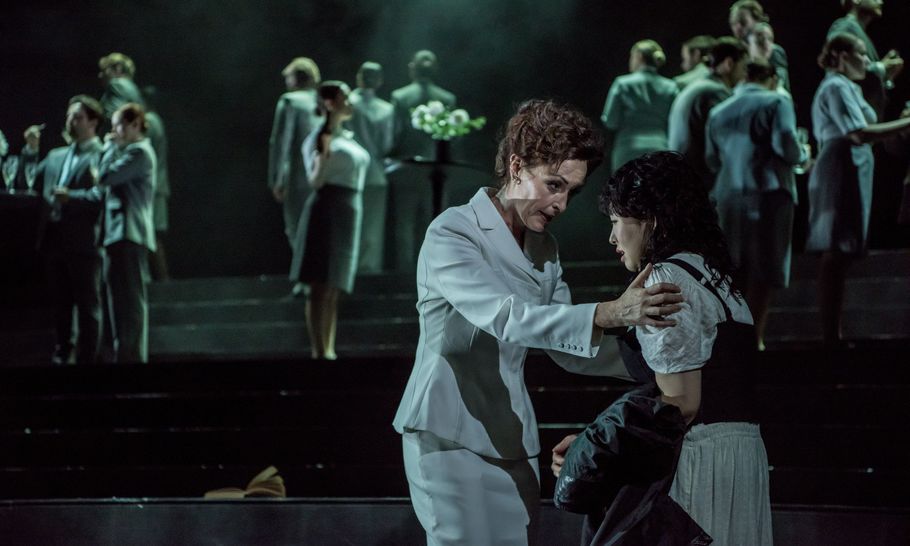‘Hamlet’ and ‘Orphée’ at the Buxton Festival

The Buxton Festival in Derbyshire is a delightful gathering of events, including opera, and it provided my first encounter with the powerful Hamlet of the French composer Ambroise Thomas. The story is different from Shakespeare’s original (for instance it ends with Hamlet ascending the throne), but in any case even without the music, a straight translation of Shakespeare could not be staged in France without accommodating the censor. An early version by Jean-François Ducis was first performed at the Comédie-Française for many years, and the Anglo-Irish actress Harriet Smithson (who later married the composer Berlioz) made an exquisitely effective Ophelia.
A personal friend of both Berlioz and Smithson was the famous French author Alexandre Dumas, who found her performances at the Odéon very moving, and prepared a new French translation for his Théâtre Historique. It replaced the Ducis version, which had fewer characters, no ghost, no duel, no players, and no gravediggers. In defence of Ducis, his modifications had been necessary at the time to gain performances in French theatres. As he told the English actor-impresario David Garrick, a ghost that speaks, itinerant players, and a fencing duel were “absolutely inadmissible” on the French stage.
Ιmportant aspects however are very much included, such as Hamlet’s famous soliloquy To be or not to be (Être ou ne pas être … ô mystère! Mourir! … dormir! … rêver! …). As a French grand opera, Thomas’s version is in the obligatory five acts, though the usual ballet was wisely excluded, and Act IV shows the death of Ophelia in a watery world, nicely represented on stage here with reeds growing all around. This production by Jack Furness, founder and director of Shadwell Opera in East London, uses a stairway across the entire stage to create varying levels for the performers, and its use of ultra-slow movement created an air of hidden menace.
The excellent conducting of Adrian Kelly, who also serves as the Festival’s artistic director, produced a gripping tension in the second half. The fine orchestra of Opera North, which Kelly brought to Buxton, gave a superb performance, as did the singers, making this the best operatic experience I have had here since I first came to Buxton more than ten years ago. As Hamlet himself, Gregory Feldmann’s rich baritone and evident agonies of fury and indecision showed him to be an up-and-coming star of the opera stage, and Yewon Han’s Ophelia showed a gentleness, a love of Hamlet and acceptance of fate that was beautifully sung. His request for her forgiveness was hugely moving. With strong bass performances by Alastair Miles as Claudius and Richard Woodall as Polonius, along with a brilliant representation of Gertrude by Allison Cook, this performance alone would be enough to bring me to Buxton.
The second evening involved four short (20 minute) operas that Buxton commissioned from four young composers — a wonderful gift to the vitality of modern opera. The most appealing, Disorderly House, with a libretto by Jessica Walker and music by Jasper Dommett, told the true story of a young gay man named Bobby Britt (Igor Sergeev) presiding over a party at a basement flat in Fitzroy Square in the 1920s. That was a time when sex between two men was illegal, and the text and music weave in allusions to Richard Strauss’s Salome (and thence to Oscar Wilde). It made a superbly judged use of twenty minutes to tell a story, ending abruptly with the arrival of the police. The other three short operas were less successful, though the first of the four, by the composer Carmel Smickersgill and the librettist Josh Overton, had the merit of giving a well-focused take on human helplessness in the face of looming disaster, represented by a stopwatch and a crank to keep it away from the final seconds of time.
On the following night we were presented with a 17th century treat, Marc-Antoine Charpentier’s La descente d’Orphée aux enfers. This brief opera opens with the wedding of Orpheus and Eurydice, where Eurydice is fatally bitten by a snake. As she slips into death he is ready to follow her, but his father Apollo suggests another option: armed only with the power of his voice, he could enter the underworld himself and sway the gods to allow him to reclaim his lost love, whilst testing his resolve to the limits.
Although the music lasts a little over an hour this production contained an inexplicable interval. Fortunately the clarity inherent in this brief contemplation of marriage and death was preserved, with fine singing from Gwilym Bowen and Betty Makharinsky as Orpheus and Eurydice, along with James Geidt as Pluto, who is persuaded to let Eurydice follow Orpheus to the world of the living. The only condition is that he never looks behind him, but it ended there without adding the well-known story that he turns round to check she is behind him, thereby losing her a second time. Brief but enjoyable, and beautifully played by the Vache Baroque Band.
Most of the audience I spoke to were local, but Hamlet and Orphée were well worth the journey from London.
A Message from TheArticle
We are the only publication that’s committed to covering every angle. We have an important contribution to make, one that’s needed now more than ever, and we need your help to continue publishing throughout these hard economic times. So please, make a donation.





